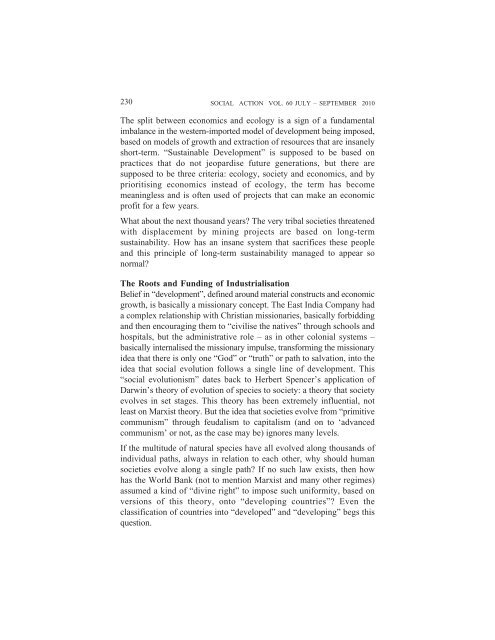Mining and Movements - Causes of Tribal Militancy - Indian Social ...
Mining and Movements - Causes of Tribal Militancy - Indian Social ...
Mining and Movements - Causes of Tribal Militancy - Indian Social ...
Create successful ePaper yourself
Turn your PDF publications into a flip-book with our unique Google optimized e-Paper software.
230SOCIAL ACTION VOL. 60 JULY – SEPTEMBER 2010The split between economics <strong>and</strong> ecology is a sign <strong>of</strong> a fundamentalimbalance in the western-imported model <strong>of</strong> development being imposed,based on models <strong>of</strong> growth <strong>and</strong> extraction <strong>of</strong> resources that are insanelyshort-term. “Sustainable Development” is supposed to be based onpractices that do not jeopardise future generations, but there aresupposed to be three criteria: ecology, society <strong>and</strong> economics, <strong>and</strong> byprioritising economics instead <strong>of</strong> ecology, the term has becomemeaningless <strong>and</strong> is <strong>of</strong>ten used <strong>of</strong> projects that can make an economicpr<strong>of</strong>it for a few years.What about the next thous<strong>and</strong> years? The very tribal societies threatenedwith displacement by mining projects are based on long-termsustainability. How has an insane system that sacrifices these people<strong>and</strong> this principle <strong>of</strong> long-term sustainability managed to appear sonormal?The Roots <strong>and</strong> Funding <strong>of</strong> IndustrialisationBelief in “development”, defined around material constructs <strong>and</strong> economicgrowth, is basically a missionary concept. The East India Company hada complex relationship with Christian missionaries, basically forbidding<strong>and</strong> then encouraging them to “civilise the natives” through schools <strong>and</strong>hospitals, but the administrative role – as in other colonial systems –basically internalised the missionary impulse, transforming the missionaryidea that there is only one “God” or “truth” or path to salvation, into theidea that social evolution follows a single line <strong>of</strong> development. This“social evolutionism” dates back to Herbert Spencer’s application <strong>of</strong>Darwin’s theory <strong>of</strong> evolution <strong>of</strong> species to society: a theory that societyevolves in set stages. This theory has been extremely influential, notleast on Marxist theory. But the idea that societies evolve from “primitivecommunism” through feudalism to capitalism (<strong>and</strong> on to ‘advancedcommunism’ or not, as the case may be) ignores many levels.If the multitude <strong>of</strong> natural species have all evolved along thous<strong>and</strong>s <strong>of</strong>individual paths, always in relation to each other, why should humansocieties evolve along a single path? If no such law exists, then howhas the World Bank (not to mention Marxist <strong>and</strong> many other regimes)assumed a kind <strong>of</strong> “divine right” to impose such uniformity, based onversions <strong>of</strong> this theory, onto “developing countries”? Even theclassification <strong>of</strong> countries into “developed” <strong>and</strong> “developing” begs thisquestion.

















